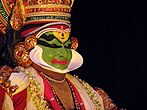Kalamandalam Gopi
Vadakke Manalath Govindan Nair | |
|---|---|
 Kalamandalam Gopi during a public function in 2011. | |
| Born | Error: Need valid birth date: year, month, day Kothachira, Palakkad, Kerala |
| Nationality | Indian |
| Other names | Kalamandalam Gopi |
| Occupation(s) | Kathakali Actor, actor |

Vadakke Manalath Govindan Nair (born 21 May 1937) popularly known as Kalamandalam Gopi is an exponent of the classical dance-drama style known as Kathakali.
Dance
He is from the village of Kothachira in Kerala, southern India and he blends the solid body grammar of the highly stylised Kalluvazhi tradition in which he was groomed with the more flexible, part-realistic, emotion-laden southern style techniques he acquired later in his career. He is often referred to by his fans as Gopiyasan. The Government of India awarded him the civilian honour of Padma Shri in 2009.[1]
He is known for the romantic and dramatic portrayal of the virtuous pachcha roles in Kathakali, notable among them being Nalan, Karnan and Rukmangadan. He is equally adept in playing the choreographically denser roles like Bheeman (in the stories Kalyanasougandhikam or Bakavadham), Arjuna (Subhadraharanam) and Dharmaputrar (that's Yudhishthira in Kirmeeravadham). Nair, a Padma Shri awardee, also excels in the yellow-faced pazhuppu roles such as Balabhadra, and has of late also branched out to portray variety roles like the anti-heroic Kathi (like Ravana, Keechaka and Duryodhana) black-bearded Kaatalan (Kiratham), red-bearded Bali (Balivijayam) and even the semi-realistic looking Brahmanan in Santanagopalam.
He is a disciple of the award-winning Kalamandalam Ramankutty Nair, Kalamandalam Padmanabhan Nair and Keezhpadam Kumaran Nair, and was trained at Kerala Kalamandalam, near Shoranur. Before that, he had a brief career as a practitioner of the more folksy Ottamthullal, the solo dance form with lyrics by the Kunchan Nambiar, a satirical poet. That was followed by his initiation into Kathakali by a leading guru called Thekkinkattil Ramunni Nair at the Koodallur Mana (a mansion of an upper-caste Namboodiri family) near Kothachira.
By the 1960s, his male protagonist roles were complemented by Kottakkal Sivaraman, who gained name as an exponent of female roles on the stage. The pair still perform on stage together, although Nair now also works with a younger colleague, Margi Vijayakumar.
Gopi, a recipient of the Central Sangeet Natak Akademi award, retired from Kalamandalam in 1992 as its principal, aged 55, after 36 years of tutorial service, and now stays in Mundoor, a village 12 km north of Thrissur, with his wife and two sons. He is still busy as a Kathakali artiste both in India and abroad. Scholars and avid Kathakali watchers alike acknowledge him as a legitimate successor to the legacy of Kalamandalam Krishnan Nair, arguably the greatest-ever Kathakali artiste, who died in 1990 at the age of 75.
On film
Gopi has also acted (without Kathakali make-up or costumes) in a couple of Malayalam feature films like Vanaprastham (directed by Shaji N. Karun) and Shantham (by Jayaraj).
Filmmaker Adoor Gopalakrishnan made a documentary film of Gopi, entitled Kalamandalam Gopi. This was well reviewed and was shown at the International Film Festival of India in 2000, as well as at other festivals within India, in the West and in the Far East. Journalist Meena (Das) Narayan produced and directed a docu-fiction about Gopi in 2010. Titled Making of a maestro, the documentary explores the evolution of Nair from childhood onwards.
Gopi's select stage performances have been shot and brought out on a commercial basis on VCDs and DVDs, mainly by Vedika, a cultural forum based in Thrissur.
- Various Veshams of Kalamandalam Gopi
-
Kalamandalam Gopi as Nalan in Nalacharitham Randam Divasam.
-
Kalamandalam Gopi as Nalan in Nalacharitham Randam Divasam.
-
Kalamandalam Gopi as Nalan in Nalacharitham Randam Divasam.
-
Kalamandalam Gopi as Nalan in Nalacharitham Randam Divasam.
-
Kalamandalam Gopi as Dasharadha in Dasharadhavilapam.
-
Padmasree Kalamandalam Gopi Asan as Karnan in Karnashapadam.
-
Kalamandalam Gopi as Nalan in Nalacharitham Randam Divasam.
References
- ^ "Padma Awards" (PDF). Ministry of Home Affairs, Government of India. 2015. Retrieved 21 July 2015.
External links
- International Film Festival of India 2000 – Kalamandalam Gopi
- Making of a Maestro – Documentary on Kalamandalam Gopi
- Articles needing cleanup from November 2008
- Cleanup tagged articles without a reason field from November 2008
- Wikipedia pages needing cleanup from November 2008
- Dancers from Kerala
- 1937 births
- Living people
- Recipients of the Padma Shri in arts
- Kathakali exponents
- People from Palakkad district
- Recipients of the Sangeet Natak Akademi Fellowship
- Recipients of the Sangeet Natak Akademi Award
- Malayali people
- 20th-century Indian dancers
- Indian male dancers







